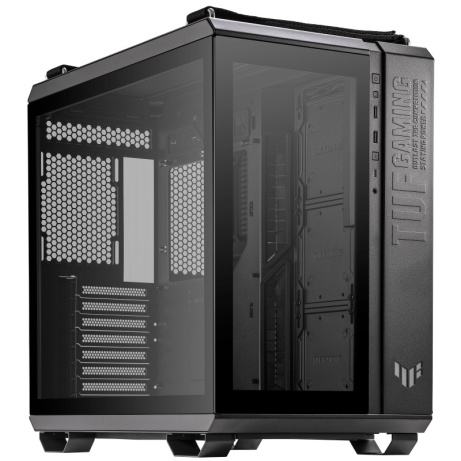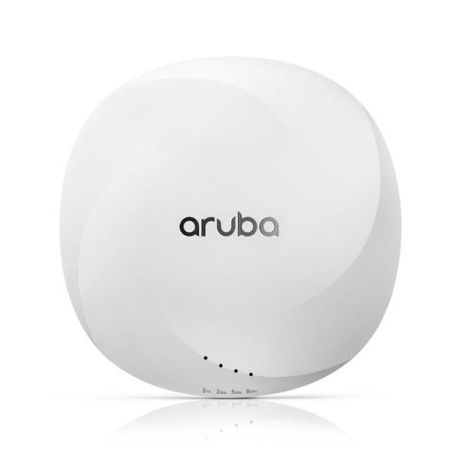 BOHEMIAPC počítačeNačítám kategorie
BOHEMIAPC počítačeNačítám kategorie Notebooky a UltrabookyNačítám kategorie
Notebooky a UltrabookyNačítám kategorie Mobilní telefony a tabletyNačítám kategorie
Mobilní telefony a tabletyNačítám kategorie Chytrá domácnostNačítám kategorie
Chytrá domácnostNačítám kategorie Herní zónaNačítám kategorie
Herní zónaNačítám kategorie- Konfigurátor sestav
Aruba AP-615 (RW) Dual-radio Tri-band 2x2:2 802.11ax Wi-Fi 6E Internal Antennas Campus AP RENEW R7J49A
Aruba AP-615 (RW) Dual-radio Tri-band 2x2:2 802.11ax Wi-Fi 6E Internal Antennas Campus AP RENEW
| Aruba 610 Series Campus Access Points |
| Fast, Resilient, and Secure Wi-Fi 6E Connectivity in a Compact and Affordable Platform For enterprises who need more wireless capacity and/or wider channels, Aruba 610 Series Campus APs are designed to take advantage of the newly available 6 GHz spectrum using a unique dual-radio/tri-band architecture. Adding support for the 6 GHz band to the traditional 2.4 GHz and 5 GHz bands more than doubles the available wireless capacity in a wireless network - so you can meet growing demand due to bandwidth-hungry video, increasing numbers of client and IoT devices, and growth in cloud. Unique to Aruba, the 610 Series features two radios that can be tuned to any two of the three available spectrum bands for Wi-Fi (2.4 GHz, 5 GHz, 6 GHz). This flexibility provides a cost-effective and compact platform that delivers full tri-band coverage as part of a multi-AP deployment and can be used with software that will intelligently and flexibly configure the radios of each of these dual-radio APs. |
| Key Features
Notes: 1When configured for 5 GHz + 6 GHz operation 2By default (with IPM disabled) the AP-615 will disable the USB port and limit the speed of the Ethernet port to 1Gbps when on class 3 POE. The Intelligent Power Monitoring feature can be used to avoid these restrictions |
Standard Features
| More Capacity and Wider Channels The Aruba 610 Series APs are designed to take advantage of Wi-Fi 6E and the 6 GHz band, which translates into far greater speeds, wider channels for multi-gigabit traffic, and less interference. Its two 2x2 MIMO radios deliver a combined peak data rate of up to 3.6 Gbps when configured for concurrent 5 GHz and 6 GHz operation. |
| Advantages of 6 GHz Wi-Fi 6E provides up to 1200 MHz of additional unlicensed spectrum in the 6 GHz band for higher throughput and improved application performance. With up to seven 160 MHz channels, Wi-Fi 6E can better support low-latency, bandwidth hungry applications like high-definition video and augmented reality/virtual reality applications. Only Wi-Fi 6E capable devices can use the 6 GHz band so there is no interference or slowdowns due to legacy devices. |
| Device Class Support The Aruba 610 Series APs are part of the low power indoor (LPI) device class. This fixed indoor-only class uses lower power levels and does not require an Automated Frequency Coordination service (AFC) to manage incumbent outdoor services, which is required for standard class APs. |
| Global Readiness While the need for more Wi-Fi capacity is recognized across the globe, countries are approaching the 6 GHz band differently. The 610 Series APs are set up to automatically update regulatory rules once Wi-Fi 6E regulations have been approved and certified. |
| Extend the Benefits of Wi-Fi 6 The Aruba 610 Series APs are based on the 802.11ax (Wi-Fi 6) standard, which means that all its efficiency and security enhancements are also available on the 6 GHz band. Wi-Fi 6 features such as Orthogonal Frequency Division Multiple Access (OFDMA), BSS coloring etc. are fully supported on the Aruba Wi-Fi 6E access points as well. |
| Advantages of OFDMA The Aruba 610 Series is equipped with OFDMA to handle multiple 802.11ax capable clients on each channel simultaneously, regardless of device or traffic type. Channel utilization is optimized by handling each transaction via smaller sub-carriers or resource units (RUs), which means that clients are sharing a channel and not competing for airtime and bandwidth. |
| Wi-Fi Optimization Client Optimization Aruba's patented AI-powered technology eliminates sticky client issues by steering a client to the AP where it receives the best radio signal. ClientMatch steers traffic from the noisy 2.4 GHz band to the preferred 5 GHz or 6 GHz band depending on client capabilities and AP setttings. ClientMatch also dynamically steers traffic to load balance APs to improve the user experience. Automated Wi-Fi Radio Frequency Management To optimize the user experience and provide greater stability, Aruba AirMatch allows organizations to automate network optimization using machine learning. AirMatch provides dynamic bandwidth adjustments to support changing device density, enhanced roaming using an even distribution of Effective Isotropic Radiated Power (EIRP) to radios, and real-time channel assignments to mitigate co-channel interference. AirMatch also ensures that the two radios of Aruba 610 Series Access Points are automatically configured in the most effective and efficient way to deliver full tri-band coverage. Application Assurance With Aruba Air Slice, organizations can provide application assurance to their users that goes beyond the traditional capabilities of airtime fairness. After the SLAs are configured, Air Slice monitors network usage, automatically allocates radio resources, and dynamically adjusts radio resources as new users connect and applications sessions begin or end. Aruba Advanced Cellular Coexistence (ACC) Unique to Aruba, Advanced Cellular Coexistence uses built-in filtering to automatically minimize the impact of interference from cellular networks, distributed antenna systems (DAS), and commercial small cell or femtocell equipment. Intelligent Power Monitoring (IPM) For better insights into energy consumption, Aruba APs continuously monitor and report hardware energy usage. Unlike other vendor's access points, Aruba APs can also be configured to enable or disable capabilities based on available PoE power - ideal when wired switches have exhausted their power budget. Enterprises can deploy Wi-Fi 6E APs and update switching and power at a later if needed based on their actual usage. Self-Locating APs Indoor location shouldn't require guesswork or costly overlay technologies. Aruba's Wi-Fi 6 and 6E APs help organizations leverage their wireless investment to deliver indoor location - everywhere. Aruba 610 Series Campus APs include built-in GPS receivers and intelligent software to allow them to automatically locate themselves accurately within the universal framework of latitude and longitude. As part of Aruba's indoor location services solution, they serve as reference points for client devices using fine time measurements (802.11mc) and other location technologies. In addition, Aruba's Wi-Fi 6 and 6E APs support Open Locate, an emerging standard that allows APs to share their location over the air and through cloud-based APIs, enabling mobile devices to locate themselves and applications to support network analytics. APs as an IoT transport platform The Aruba 610 Series includes an integrated Bluetooth 5 and 802.15.4 radio for Zigbee support to simplify deploying and managing IoT-based location services, asset tracking services, security solutions, and IoT sensors. There is also a USB-port extension to provide IoT connectivity to a wider range of devices. These IoT capabilities allows organizations to leverage Aruba APs as an IoT transport platform, which eliminates the need for an overlay infrastructure and additional IT resources and can accelerate IoT initiatives. In addition, Target Wake Time (TWT), part of the 802.11ax standard, establishes a schedule for when clients need to communicate with an AP. This helps improve client power savings and reduces airtime contention with other clients, which is ideal for IoT. Aruba secure infrastructure The Aruba 610 Series includes build-security capabilities such as:
|
| Summary Aruba 610 Series Access Points are designed to take advantage of the 6 GHz band using two radios that can deliver comprehensive tri-band coverage in a multi-AP environment and better meet the growing demands of Wi-Fi due to increased use of video, growth in client and IoT devices, and expanded use of cloud. With a 3.6 Gbps combined peak data rate for higher throughput and faster speeds for indoor use, the Aruba 610 Series delivers a cost-effective enterprise Wi-Fi 6E solution with increased capacity, wider channels, reduced power consumption. |
| BTO Models | ||
| 615 Internal Antenna Access Points | ||
| Rule # | Description | SKU |
|
| Aruba AP-615 (EG) Dual-radio Tri-band 2x2:2 802.11ax Wi-Fi 6E Internal Antennas Campus AP | R7J46A |
|
| Aruba AP-615 (IL) Dual-radio Tri-band 2x2:2 802.11ax Wi-Fi 6E Internal Antennas Campus AP | R7J47A |
|
| Aruba AP-615 (JP) Dual-radio Tri-band 2x2:2 802.11ax Wi-Fi 6E Internal Antennas Campus AP | R7J48A |
|
| Aruba AP-615 (RW) Dual-radio Tri-band 2x2:2 802.11ax Wi-Fi 6E Internal Antennas Campus AP | R7J49A |
|
| Aruba AP-615 (US) Dual-radio Tri-band 2x2:2 802.11ax Wi-Fi 6E Internal Antennas Campus AP | R7J50A |
| 615 Internal Antenna Access Points - TAA Models | ||
| Rule # | Description | SKU |
|
| Aruba AP-615 (EG) TAA Dual-radio Tri-band 2x2:2 802.11ax Wi-Fi 6E Internal Antennas Campus AP | R7J51A |
|
| Aruba AP-615 (IL) TAA Dual-radio Tri-band 2x2:2 802.11ax Wi-Fi 6E Internal Antennas Campus AP | R7J52A |
|
| Aruba AP-615 (JP) TAA Dual-radio Tri-band 2x2:2 802.11ax Wi-Fi 6E Internal Antennas Campus AP | R7J53A |
|
| Aruba AP-615 (RW) TAA Dual-radio Tri-band 2x2:2 802.11ax Wi-Fi 6E Internal Antennas Campus AP | R7J54A |
|
| Aruba AP-615 (US) TAA Dual-radio Tri-band 2x2:2 802.11ax Wi-Fi 6E Internal Antennas Campus AP | R7J55A |
| Notes: | Add Mount Kit OCA Only Model Selection Form - HPE Offering > Aruba > Wireless > Access Points > Campus: Aruba 610 Series Campus Access Points | |
| Mount Accessories | ||
| AP Mount Kits | ||
| Rule # | Description | SKU |
| AP-MNT-A Campus AP mount bracket kit (individual) type A: suspended ceiling rail flat 9/16 | R3J15A | |
| 1 | HPE Aruba Networking AP-MNT-MP10-A Campus AP 10-Pack 9/16 Flat Ceiling Rail Mount Bracket Kit | JZ370A |
| AP-MNT-B Campus AP mount bracket kit (individual) type B: suspended ceiling rail flat 15/16 | R3J16A | |
| 1 | HPE Aruba Networking AP-MNT-MP10-B Campus AP 10-Pack 15/16 Flat Ceiling Rail Mount Bracket Kit | Q9G69A |
| 1 | HPE Aruba Networking AP-MNT-MP10-B1 Campus AP 10-Pack 15/16 Adj Flat Ceiling Rail Mount Bracket Kit | R6T34A |
| AP-MNT-C Campus AP mount bracket kit (individual) type C: suspended ceiling rail profile 9/16 | R3J17A | |
| 1 | HPE Aruba Networking AP-MNT-MP10-C Campus AP 10-Pack Profile 9/16 Ceiling Rail Mount Bracket Kit | Q9G70A |
| AP-MNT-D Campus AP mount bracket kit (individual) type D: solid surface | R3J18A | |
| 1 | HPE Aruba Networking AP-MNT-MP10-E Campus AP 10-Pack Wall-box Mount Bracket Kit | Q9G71A |
| AP-MNT-E Campus AP mount bracket kit (individual) type E: wall-box | R3J19A | |
| 1 | HPE Aruba Networking AP-MNT-MP10-E Campus AP 10-Pack Wall-box Mount Bracket Kit | R1C72A |
| 1 | HPE Aruba Networking AP-MNT-MP10-U Campus AP Universal Mount Bracket Kit (10-pack) | S0J40A |
| 1 | AP-MNT-MP10-X Campus AP mount adapter kit (10-pack) | R3T20A |
| Configuration Rules | ||
| Rule # | Description | |
| 1 | OCA Display Notes: Kit contains mounts for 10 access points | |
| Notes: | Clic Warning: Access Points do not include a Mount. Qty 1 Mount kits should be selected. | |
| Power Options | ||
| Power Options | ||
| Rule # | Description | SKU |
| 1 | AP-AC2-12B 12V/48W AC/DC desktop style power adapter with 2.1/5.5mm connector | R3K00A |
| ||
| 1 | AP-POE-AFGE 1-Port GbE 802.3af 15.4W midspan injector | R6P68A |
| ||
| 1 | AP-POE-ATSR 1-Port Smart Rate 802.3at 30W midspan injector | R6P67A |
| ||
| Configuration Rules | ||
| Rule # | Description | |
| 1 | If this Power Supply is selected, bring in (Min 1 // Max 1) Localized power cord based on the Aruba Wireless Power Cord Table Menu | |
| Notes: | OCA Display Notes: Most devices are PoE powered from switch so these are optional | |
| Accessories | ||
| Snap-on Covers | ||
| Rule # | Description | SKU |
| Aruba AP-615-CVR-20 20-pack White Non-glossy Snap-on Covers for AP-615 | R7J56A | |
| Notes: | Kit contains covers for 20 access points | |
| Configuration Rules | ||
| Rule # | Description | |
| Notes: | OCA Display Notes: Kit contains 20 optional snap-on covers | |
| Other Accessories | ||
| Rule # | Description | SKU |
| Aruba AP-CBL-EXT10 10-pack CAT6A Ethernet Extension Cables | R8L34A | |
| ||
| AP-CBL-SERU Micro-USB TTL3.3V to USB2.0 AP Console Adapter Cable | JY728A | |
| ||
| AP-MOD-SERU Micro-USB TTL3.3V to RJ45 RS232 AP Console Adapter Module | R6Q99A | |
| Aruba AP-USB-ZB External USB based Dongle with Zigbee and BLE for AP | R2X45A | |
| ||
| Aruba AP-USB-ZB 10-pk External USB based Dongle with Zigbee and BLE for AP | R2Y09A | |
| ||
| Aruba AP-USB-ZB 50-pk External USB based Dongle with Zigbee and BLE for AP | R2Y10A | |
| ||
| Aruba USB LTE Modem for use with Access Points and Gateways | R8F34A | |
| Aruba USB Extender Cable Kit for use with Aruba USB LTE Modem | R8G76A | |
| ||
Technical Specifications
| Hardware Variants AP-615: Internal antenna models | ||
| Wi-Fi Radio Specifications
- 2.400 to 2.4835GHz ISM - 5.150 to 5.250GHz U-NII-1 - 5.250 to 5.350GHz U-NII-2A - 5.470 to 5.725GHz U-NII-2C - 5.725 to 5.850GHz U-NII-3/ISM - 5.850 to 5.895GHz U-NII-4 - 5.925 to 6.425GHz U-NII-5 - 6.425 to 6.525GHz U-NII-6 - 6.525 to 6.875GHz U-NII-7 - 6.875 to 7.125GHz U-NII-8 Notes: 3When configured for concurrent operation in 5GHz and 6GHz (only), the U-NII-5 band will be disabled.
- 802.11a/g/n/ac: Orthogonal frequency-division multiplexing (OFDM) - 802.11ax: Orthogonal frequency-division multiple access (OFDMA) with up to 8 resource units
- 802.11b: BPSK, QPSK, CCK - 802.11a/g/n: BPSK, QPSK, 16-QAM, 64-QAM and 256- QAM (proprietary extension) - 802.11ac: BPSK, QPSK, 16-QAM, 64-QAM, 256-QAM and 1024-QAM (proprietary extension) - 802.11ax: BPSK, QPSK, 16-QAM, 64-QAM, 256-QAM and 1024-QAM
- 802.11b: 1, 2, 5.5, 11 - 802.11a/g: 6, 9, 12, 18, 24, 36, 48, 54 - 802.11n: 6.5 to 300 (MCS0 to MCS15, HT20 to HT40), 400 with 256-QAM (proprietary extension) - 802.11ac: 6.5 to 867 (MCS0 to MCS9, NSS = 1 to 2, VHT20 to VHT80); 1,083 with 1024-QAM (MCS10 and MCS11, proprietary extension) - 802.11ax (2.4GHz): 3.6 to 574 (MCS0 to MCS11, NSS = 1 to 2, HE20 to HE40) - 802.11ax (5GHz): 3.6 to 1,201 (MCS0 to MCS11, NSS = 1 to 2, HE20 to HE80) - 802.11ax (6GHz): 3.6 to 2,402 (MCS0 to MCS11, NSS = 1 to 2, HE20 to HE160)
Notes: Conducted transmit power levels exclude antenna gain. For total (EIRP) transmit power, add antenna gain.
| ||
| Wi-Fi Antennas
- Combining the patterns of each of the antennas of the MIMO radios, the peak gain of the combined, average pattern is 2.0dBi in 2.4GHz, 3.5dBi in 5GHz and 3.4dBi in 6GHz. | ||
| Other Interfaces and Features
- 2.5Gbps speed complies with NBase-T and 802.3bz specifications - POE-PD: 48Vdc (nominal) 802.3af/at POE (class 3 or higher) - 802.3az Energy Efficient Ethernet (EEE)
- Capable of sourcing up to 1A / 5W to an attached device
- BLE: up to 5dBm transmit power (class 1) and -100dBm receive sensitivity (125kbps) - Zigbee: up to 5dBm transmit power and -97dBm receive sensitivity (250kbps) - Integrated omnidirectional antenna with roughly 30 to 40 degrees downtilt and peak gain of 2.6dBi
- Receive sensitivity: -162dBm (tracking) - Integrated omnidirectional antenna with roughly 30 to 40 degrees downtilt and peak gain of 2.3dBi
| ||
| Power Sources and Power Consumption
- DC powered: 12.5W/18.2W. - POE powered: 14.7W/20.9W. - This assumes that up to 5W is supplied to the attached USB device.
| ||
| POE Source | Class 4 (802.3at) | Class 3 (802.3af) |
| Power budget | 25.5W | 13.9W |
| Power mode | Unrestricted | Restricted |
| USB port | Enabled | Disabled |
| Ethernet | Enabled | Enabled |
| MIMO | 2x2 | 2x2 |
| Max RF power reduction | 0dB | 0dB |
|
POE operating modes and default restrictions with IPM disabled Mounting Details A mounting bracket has been pre-installed on the back of the AP. This bracket is used to secure the AP to any of the mount kits (sold separately); see the 610 Series Ordering Guide for details. | ||
| Mechanical Specifications
- 160mm (W) x 160mm (D) x 39mm (H) - 520g
- 212mm (W) x 194mm (D) x 66mm (H) - 800g | ||
| Environmental Specifications
- Temperature: 0C to +50C / +32F to +122F - Relative humidity: 5% to 95% - ETS 300 019 class 3.2 environments - AP is plenum rated for use in air-handling spaces
- Temperature: -25C to +55C / +13F to +131F - Relative humidity: 10% to 100% - ETS 300 019 class 1.2 environments
- Temperature: -40C to +70C / -40F to +158F - Relative humidity: up to 95% - ETS 300 019 class 2.3 environments | ||
| Reliability Mean Time Between Failure (MTBF): 540khrs (62yrs) at +25C operating temperature. | ||
| Regulatory Compliance
For more country-specific regulatory information and approvals, please see your Aruba representative. |
| Regulatory Model Numbers
|
| Certifications
- Wi-Fi Alliance (WFA): Wi-Fi CERTIFIED a, b, g, n, ac - Wi-Fi CERTIFIED 6E (ax, 6GHz) - WPA, WPA2 and WPA3 - Enterprise with CNSA option, Personal (SAE), Enhanced Open (OWE) - WMM, WMM-PS, Wi-Fi Vantage, W-Fi Agile Multiband - Passpoint (release 2)
|
| Warranty Aruba's hardware limited lifetime warranty |
| Minimum Operating System Software Versions ArubaOS and Aruba InstantOS 8.11.0.0 |
| RF Performance Table | ||
| Band, Rate | Maximum Transmit Power (dBm) per Transmit Chain | Receiver Sensitivity (dBm) per Receive Chain |
| 2.4GHz, 802.11b | ||
| 1Mbps | 18.0 | -95.0 |
| 11Mbps | 18.0 | -87.0 |
| 2.4GHz, 802.11g | ||
| 6Mbps | 18.0 | -93.0 |
| 54Mbps | 18.0 | -75.0 |
| 2.4GHz, 802.11n HT20 | ||
| MCS0 | 18.0 | -93.0 |
| MCS7 | 16.0 | -74.0 |
| 2.4GHz, 802.11ax HE20 | ||
| MCS0 | 18.0 | -93.0 |
| MCS11 | 13.0 | -62.0 |
| 5GHz, 802.11a | ||
| 6Mbps | 18.0 | -93.0 |
| 54Mbps | 16.0 | -75.0 |
| 5GHz, 802.11n HT20 / HT40 | ||
| MCS0 | 18.0 / 18.0 | -92.0 / -89.0 |
| MCS7 | 16.0 / 16.0 | -73.0 / -70.0 |
| 5GHz, 802.11ac VHT20 / VHT40 / VHT80 | ||
| MCS0 | 18.0 / 18.0 / 18.0 | -92.0 / -89.0 / -86.0 |
| MCS9 | 15.0 / 15.0 / 15.0 | -67.0 / -64.0 / -61.0 |
| 5GHz, 802.11ax HE20 / HE40 / HE80 | ||
| MCS0 | 18.0 / 18.0 / 18.0 | -91.0 / -89.0 / -86.0 |
| MCS11 | 13.0 / 13.0 / 13.0 | -62.0 / -59.0 / -56.0 |
| 6GHz, 802.11ax HE20 / HE40 / HE80 / HE160 | ||
| MCS0 | 18.0 / 18.0 / 18.0 / 18.0 | -91.0 / -88.0 / -85.0 / -82.0 |
| MCS11 | 13.0 / 13.0 / 13.0 / 13.0 | -62.0 / -59.0 / -56.0 / -53.0 |
.
